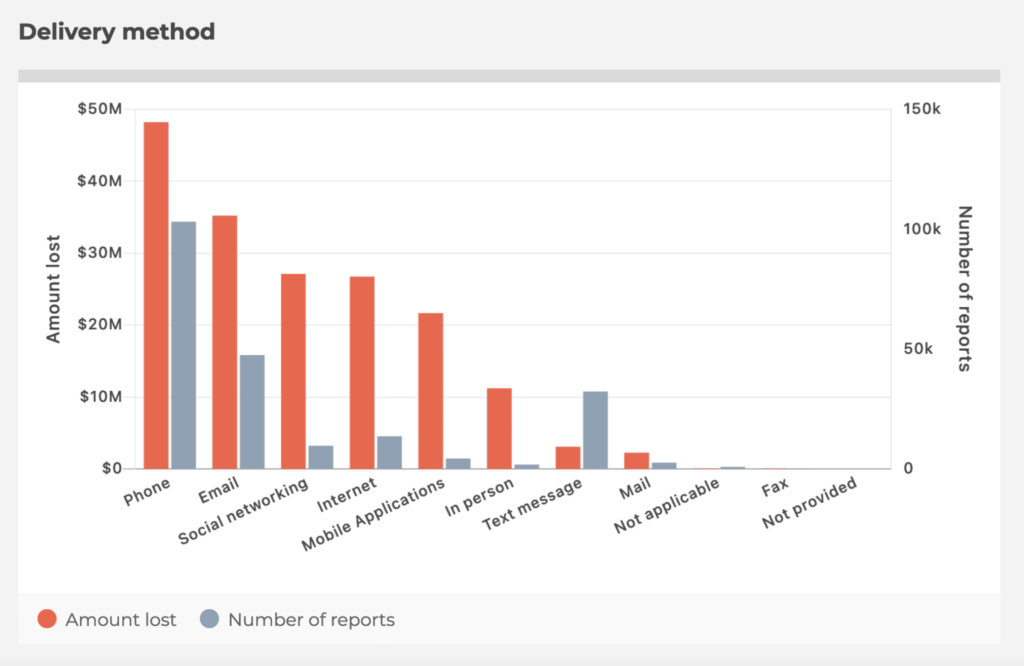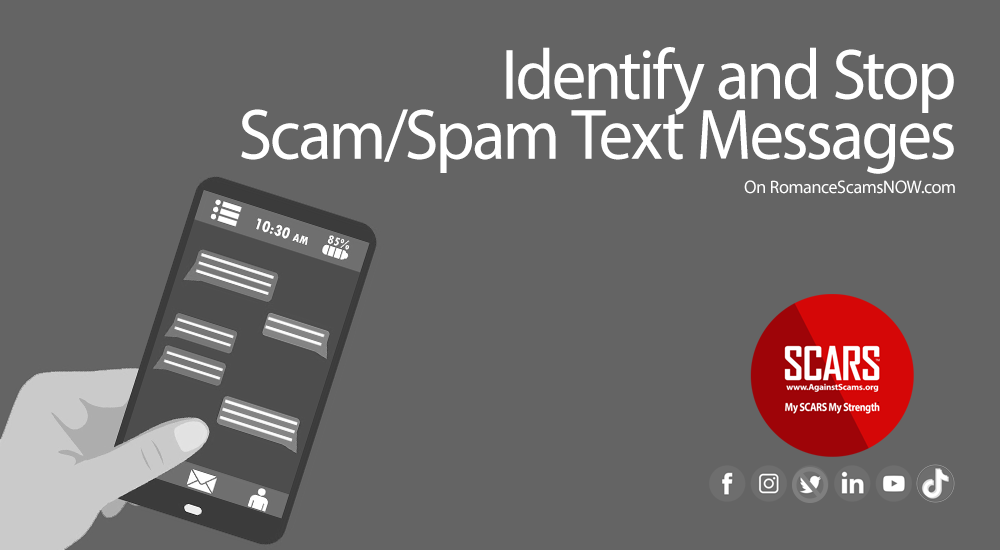Text Message Scams, Phishing Messages, & Spam Texts
One Of The Greatest Battlegrounds Of Today’s Internet Is On Your Phone!
Text and Instant messaging is a growing source of cybercrime and this means that as much as half of all are victimized. In Brazil. alone in 2020 there were more than 5 million WhatsApp victims.
Of course, no one likes spam messages, but there is far more to this than a simple annoyance.
This SCARS Guide will help you to identify and avoid these online and on-device risks.
Current Trends On Cybercrime
- Phishing attacks are still extremely common
- Credential phishing is becoming less common
- Spear phishing emails are the most popular targeted attack vector
- Human intelligence is the best defense against phishing attacks
- Phishing attacks are getting more sophisticated
- Attackers are using tricks such as Zombie Phish and shortened URLs
- Webmail and SaaS users continue to be the biggest targets
- Smaller organizations see a higher rate of malicious emails
- Malicious emails are most likely to hit mining companies
- People in Saudi Arabia are most likely to receive malicious emails
- Many data breaches stem from phishing attacks
- Knowledge of phishing terms varies among generations
- Sextortion is a common tactic in phishing campaigns
- Popular apps continue to be used to distribute malware
- Secure Email Gateway (SEG) are far from free of phishing attacks
- Malicious attachments remain common
- Some phishing attack payloads are location-aware
- SSL is no longer an indicator of a safe site.
- Gift cards are still a popular form of payment in BEC attacks
- A custom phishing page costs $3–12
Confused Consumers
Most people believe that they know a scam when they see one. Most users also believe that “scams could never happen to me…” but a recent study by McAfee shows that over 97% of consumers were unable to correctly identify phishing scams when presented with them.
As digital communication has evolved so has the sophistication of cybercriminals. In addition to fraudulent phone calls and email phishing scams, text scams have become more common with the proliferation of smartphones and the emergence of text and instant messages as a part of everyday communication. This type of fraud is also known as “smishing.”
SMS phishing (aka Smishing) is the fraudulent solicitation of your personal information through the use of text messaging. Although far less common than other kinds of digital dupes, smishing can be effective due to the personal nature of our inbox. After all, texts are reserved for close friends, family, and businesses who we have consented to connect.
So, how can you protect yourself from smishing scams and spot them before it’s too late? We have the low down on all the warning signs as well as what to do if you encounter one.
SimpleTexting Tip: To help you out, we have a team dedicated to compliance who monitor messages sent through ST for suspicious activity to ensure our platform is only used for good!
5 Tips
To Identify Fake Text Messages or Text Scams
While each text scam looks a little different, there are some common hallmarks of these messages you can look out for that serve as dead giveaways for fraud.
1. Unusually Long Numbers
Legitimate SMS marketing messages are often sent from a 6-digit shortcode (like 711711), a 10-digit toll-free number (ex: 844-462-2554) or a local text-enabled business phone. If you were to receive a text message from an unidentified 11-digit number, the odds are high that it’s a scam.
So, even if they identify themselves as your bank, realtor, insurance agent, etc. you should look to the number the message was sent from for verification. The potential of this happening is low, but it is still something to be wary of!
2. Random Family Emergency Texts
The family emergency scam is one of the most common tricks according to the FCC. In this instance, you’ll receive a text message saying something along the lines of “your family member who lives in __ (or is traveling in __) has run into some trouble. They’re in need of financial help and a money transfer is the only way to help them.” In some instances, they can even say that contacting this family member will cause them danger.
These texts can be very frightening, which is why they work. However, before you take any action or send money, take a pause. Attempt to verify the person’s identity by asking questions a stranger couldn’t know the answers to. Reach out to a trusted family member or friend to verify the scammer’s story (even if they say to keep it a secret). And always feel free to call 1-877-FTC-HELP for advice.
EXAMPLE:Today 11:34 AMYour grandson is being held in jail. He needs bail money right away.
3. Refund Scams
Another common smishing scam comes not in the form of asking for money, but in claiming money is owed to you. A fake refund often comes from a “government” agency or monthly billing program (like your cell phone provider) letting you know you were “overcharged”. Oftentimes they will direct you to share direct deposit information so a charge can be reversed. In this case, once they secure your routing number, they can access your account and steal from you.
EXAMPLE:Today 9:55 AMAT&T: Your postpaid account has been charged USD500 for LTE use. Is this a wrong charge? Text 500 send to 2936XXXXXXX for REFUND
4. Reactivation Scam
These scams tend to look innocent on the surface. They generally say something along the lines of “your [email, text, app] password has been [comprised, used with another device, hacked]. Your account has been deactivated for your protection. Text XXXXX to reactivate your account.” In the case of these messages, simply delete the messages (and report them). Do NOT reply or send passwords. Simply check the accounts in question. When you see they haven’t been deactivated you’ll have your answer.
EXAMPLE:Today 3:00 PMUser #25388: Your Gmail profile has been compromised. We have deactivated it for your protection. Text back SENDNOW in order to reactivate your account.
5. “You’ve Won a Prize!”
Another one of the most common text scams is also the simplest. Recipients receive a text informing them that they’ve won a prize, giveaway, or something of that nature. Through either a hyperlink or reply they’re instructed to reach out to claim the reward. However, this is yet another ploy to receive your personal information.
In this case, if you did not enter to win anything, ignore the message. If you’re not sure if you did (let’s face it, we all enter contests hoping for something every now and then) reach out to the brand on their verified website or social media pages to double-check.
What to Do if You Fall Victim to a Text Scam
If you “fall” for a text scam, know that you’re not alone. Last year 47,567 different scams were added to the Better Business Bureau (BBB) Scam Tracker, with numerous victims for each new plot.
The good news is, the worst-case scenario is not always the most common. Just because you’ve sent money to a scammer doesn’t mean that tomorrow you’ll be homeless and penniless. The important thing is to realize your mistake and act as quickly as you can.
- Cancel credit cards used for transactions and report the fraud
- Inform your cell phone carrier of the fraudulent number and incident
- Block the number from your phone
- Change your passwords on important/sensitive apps such as online banking, social media, any other space with personal information stored.
Once you’ve taken these precautions, the FTC warns of a few possible outcomes from the scam:
- Malware: responding to a text can potentially invite malware to get installed on your device which can gather personal information.
- Unwanted charges: due to the fact that message and data rates may apply to any text exchange, you may notice unwanted charges on your next cellphone bill due to your interaction with the scammers.
- Slow cell speeds: junk or spam installed on your phone from hackers may cause your phone’s sending and browsing speeds to slow down.
Tips to Stop Text Scams or “Smishing” Messages
If you’re looking to “can the spam” when you receive it and end the smishing scam for good, there are a few things you can do:
- Slow down: Often times acting too quickly when you receive these messages can result in an error. The scammers want you to feel confused and rushed. So remember to slow down and don’t fall into the trap of providing an immediate response.
- Don’t click: Never ever (ever) click on an in-message link if you suspect that it’s spam.
- Delete the message: Don’t risk accidentally replying to or saving that content on your phone. If you are reporting the message, feel free to take a screenshot for posterity. But then delete it completely.
- Report the spam: You can report any suspected text spam directly to your carrier or to the FTC through their complaint assistant.
The silver lining in all of this remains: text message scams are far less common than other digital tactics.

Resources
Always remember that knowledge is your greatest defense against scams. For a comprehensive list of the most popular scams and frauds in the US, check out this government-developed guide.




Leave A Comment